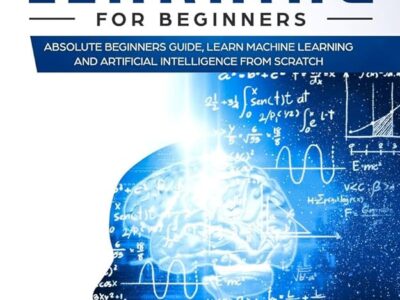Requirements
- This course is intended for individuals with a solid understanding of machine learning fundamentals and programming experience in Python. Familiarity with linear algebra, calculus, statistics, and basic machine learning concepts (e.g., regression, classification, clustering) is required.
Welcome to the Advanced Machine Learning course, designed for aspiring data scientists, machine learning engineers, and professionals looking to deepen their understanding of advanced machine learning techniques and their practical applications. In this course, you’ll delve into advanced concepts, algorithms, and methodologies of machine learning, culminating in a hands-on live project where you’ll tackle a real-world problem using cutting-edge machine learning techniques.
Here’s what you can expect to learn:
- Advanced Supervised Learning Techniques:
- Explore advanced supervised learning algorithms such as ensemble methods (Random Forests, Gradient Boosting), support vector machines (SVM) with kernel methods, and deep learning models (convolutional neural networks, recurrent neural networks).
- Learn advanced techniques for handling imbalanced datasets, such as oversampling, undersampling, and synthetic data generation.
- Understand how to apply transfer learning and fine-tuning to leverage pre-trained models for specific tasks.
- Unsupervised Learning and Dimensionality Reduction:
- Deepen your understanding of unsupervised learning with advanced clustering algorithms (DBSCAN, Gaussian mixture models) and anomaly detection techniques.
- Explore dimensionality reduction methods such as t-distributed stochastic neighbor embedding (t-SNE) and autoencoders for feature extraction and visualization.
- Learn how to use advanced techniques like manifold learning to uncover the underlying structure of high-dimensional data.
- Reinforcement Learning and Deep Reinforcement Learning:
- Gain an in-depth understanding of reinforcement learning algorithms, including Q-learning, policy gradients, and actor-critic methods.
- Explore the principles and applications of deep reinforcement learning in domains such as robotics, game playing, and autonomous systems.
- Implement deep reinforcement learning algorithms using popular frameworks such as TensorFlow or PyTorch.
- Time Series Analysis and Forecasting:
- Master time series analysis techniques, including decomposition, stationarity testing, autocorrelation, and seasonality detection.
- Learn how to build time series forecasting models using traditional methods (ARIMA, SARIMA) and modern deep learning approaches (LSTM, GRU).
- Explore advanced topics in time series analysis, such as multivariate time series, irregularly sampled data, and forecasting uncertainty estimation.
- Natural Language Processing (NLP):
- Dive into the field of natural language processing (NLP) and learn how to process, analyze, and understand textual data.
- Explore advanced NLP techniques such as word embeddings, sequence-to-sequence models, attention mechanisms, and transformer architectures.
- Build and deploy NLP applications for tasks such as sentiment analysis, text classification, named entity recognition, and machine translation.
- Live Project: Apply your advanced machine learning knowledge and skills to a challenging live project, where you’ll work on a real-world problem statement from conception to deployment. Collaborate with your peers and instructor to analyze complex datasets, design and train sophisticated machine learning models, and deploy your solution in a production environment. By the end of the project, you’ll have developed a scalable and robust machine learning solution that addresses a specific business or research problem.
- Project Presentation and Feedback: Present your live project to the class and receive constructive feedback from your peers and instructor. Gain insights into your project’s strengths, identify areas for improvement, and learn from others’ experiences and best practices.
- Advanced Topics and Emerging Trends: Stay abreast of the latest advancements and emerging trends in machine learning, including topics such as generative adversarial networks (GANs), federated learning, meta-learning, and reinforcement learning in meta-learning. Explore real-world applications and case studies to understand how these techniques are being used to solve complex problems in diverse domains.
- Career Development and Industry Insights: Gain practical insights and advice on advancing your career in machine learning and data science. Learn about industry best practices, job roles and responsibilities, interview preparation, and strategies for continuous learning and professional growth.
By the end of this course, you’ll have mastered advanced machine learning techniques and gained practical experience through a challenging live project. Whether you’re aiming to advance your career, tackle complex data-driven challenges, or contribute to cutting-edge research in machine learning, this course will empower you with the knowledge, skills, and confidence to succeed in the rapidly evolving field of machine learning.
Course Features
- Lectures 0
- Quizzes 0
- Duration 24 weeks
- Skill level All levels
- Language English
- Students 0
- Assessments Yes






